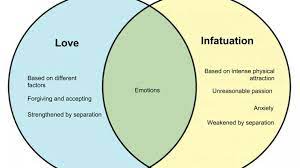In the realm of human emotions, few are as complex and intriguing as the distinction between love and infatuation. These two powerful feelings often intermingle, making it challenging to discern one from the other. In this comprehensive guide, we will explore the intricate differences between love and infatuation, helping you gain a deeper understanding of your own emotions and relationships.
Defining Love
Love, a word often used and frequently misunderstood, is a profound emotion that transcends the bounds of mere affection or attraction. True love is characterized by several key elements:
1. Commitment
Love entails a deep and enduring commitment to the well-being and happiness of your partner. It is a conscious choice to stand by them through thick and thin, demonstrating unwavering support and loyalty.
2. Selflessness
In love, your partner’s needs and desires are as important as your own. Selflessness is a hallmark of love, where you prioritize the happiness and fulfillment of your loved one over your own interests.
3. Longevity
Love is timeless. It endures and grows stronger over time. The passage of years only deepens the bond, as shared experiences and challenges become integral to the relationship.
4. Unconditional
Love is unconditional, meaning it exists without judgment or conditions. Regardless of flaws or imperfections, genuine love accepts and embraces them.
Recognizing Infatuation
Infatuation, on the other hand, is often mistaken for love due to its intense and passionate nature. However, infatuation differs in several fundamental ways:
1. Short-Lived
Infatuation is fleeting. It can burn brightly but often fades as quickly as it ignites. Unlike love, which grows stronger over time, infatuation can dissipate within weeks or months.
2. Superficial
Infatuation tends to be rooted in physical attraction or the allure of novelty. It may not take into account the deeper, more enduring aspects of a person’s character.
3. Possessiveness
Infatuation can be possessive and jealous, often stemming from insecurity. It might involve an intense desire to control or dominate the object of affection.
4. Idealization
Infatuation can lead to an idealized perception of the person you’re infatuated with, often ignoring their flaws or human imperfections.
A Closer Look
To further distinguish love from infatuation, let’s delve deeper into some key aspects:
Communication
- Love: Open and honest communication is a hallmark of love. Partners in love feel comfortable discussing their feelings and concerns, fostering a sense of emotional intimacy.
- Infatuation: Communication in infatuation can be superficial, focusing primarily on romantic gestures, rather than genuine emotional connection.
Sacrifice
- Love: Love often involves sacrifices for the sake of your partner’s happiness. This could mean compromising your own desires for the greater good of the relationship.
- Infatuation: Infatuation may involve giving up certain things temporarily to win over someone’s affection, but it often lacks the selflessness seen in love.
Conflict Resolution
- Love: In loving relationships, conflicts are seen as opportunities for growth and understanding. They are handled with patience, respect, and a desire to find mutually beneficial solutions.
- Infatuation: Conflicts in infatuation can lead to drama and emotional upheaval. Resolution may be focused on immediate satisfaction rather than long-term harmony.
Emotional Connection
- Love: Love is marked by a profound emotional connection that goes beyond the physical. It involves genuine care, empathy, and support.
- Infatuation: While emotional connections can exist in infatuation, they are often based on the excitement of being infatuated rather than a deep understanding of one another.


